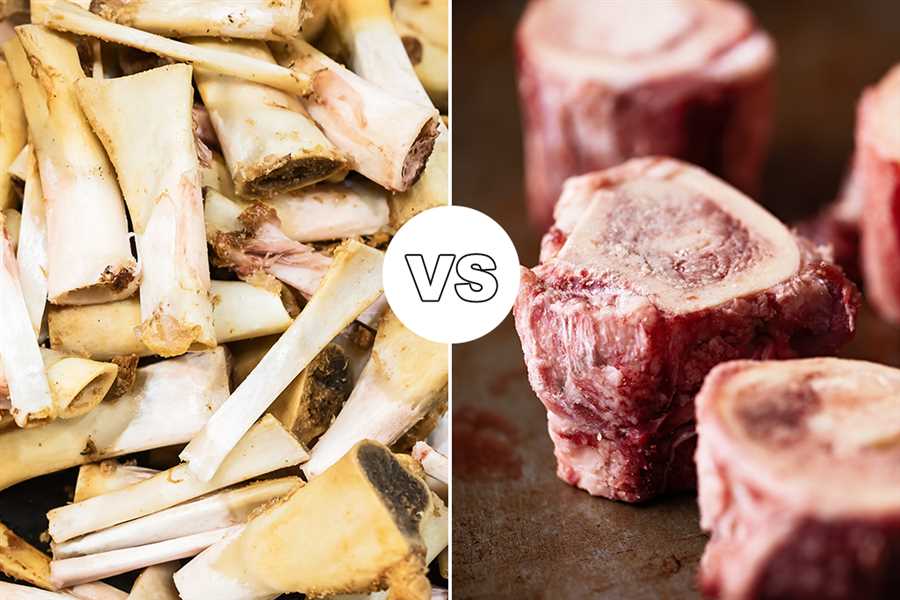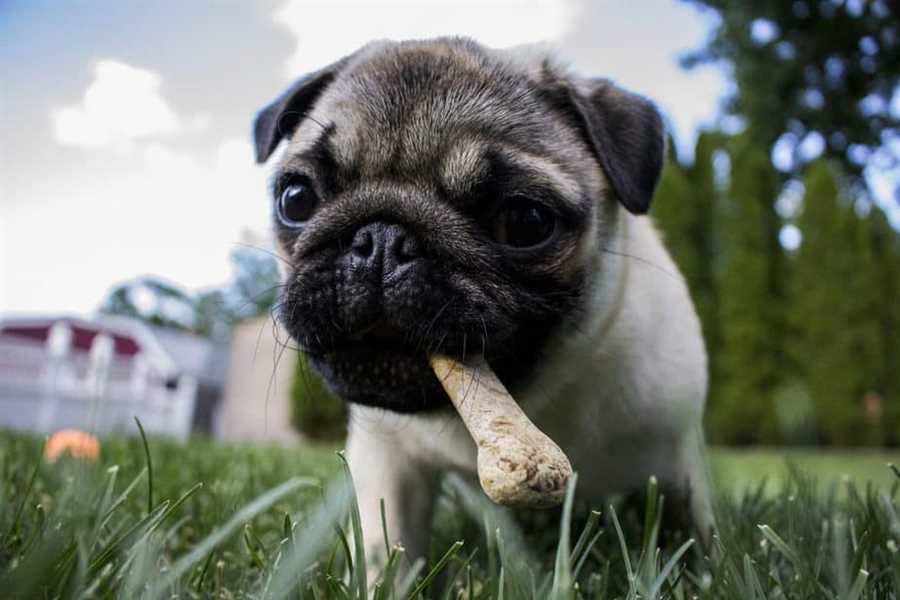



Many dog owners wonder whether it is safe to give their furry friends cooked steak bones. While dogs are known for their love of chewing, not all bones are safe for them to consume. It’s important to understand the potential risks associated with feeding dogs cooked steak bones and to make an informed decision about whether it is the right choice for your pet.
The Risks: Cooked steak bones can pose several risks to dogs. When bones are cooked, they become brittle and can splinter easily. These sharp pieces can cause serious injuries to a dog’s mouth, throat, or digestive tract. Ingesting cooked bones can also lead to intestinal blockages or punctures, which may require emergency veterinary care.
It’s important to note that raw bones, on the other hand, can be a safer option for dogs. Raw bones are softer and less likely to splinter, but they still come with their own set of risks and should be given under careful supervision.
The Alternative: Instead of giving your dog cooked steak bones, consider providing them with safe and appropriate chew toys. There are many durable toys available that are designed specifically for dogs and can satisfy their natural urge to chew. Look for toys made of non-toxic materials and avoid small parts that could be easily swallowed.
Consult Your Veterinarian: If you’re unsure about whether it is safe to give your dog cooked steak bones or if you have any concerns about their chewing habits, it’s always best to consult with your veterinarian. They can provide you with individualized advice based on your dog’s breed, age, and overall health, helping you make the best decision for your beloved pet.
Can Dogs Eat Cooked Steak Bone?
Many dog owners wonder if it is safe to give their dogs a cooked steak bone as a treat. While dogs certainly love bones and it may seem like a natural choice, there are actually risks involved.
When steak bones are cooked, they become brittle and can splinter easily. These sharp splinters can cause serious harm to a dog’s mouth, throat, or digestive tract. If a piece of bone gets lodged in their throat or intestines, it can lead to choking or even internal injuries.
It is important to note that raw bones are generally safer than cooked bones, as they are softer and less likely to splinter. However, even with raw bones, there is still a risk of them causing injury or obstruction.
Instead of giving your dog cooked steak bones, it is recommended to opt for safer alternatives. There are plenty of commercial dog chews and bones specifically designed to be safe for dogs to chew on. These options are made to be more digestible and less likely to splinter, reducing the risk of injury.
If you are concerned about your dog’s dental health and want to provide them with something to chew on, it is best to consult with your veterinarian to find the most suitable options.
In conclusion, dogs should not be given cooked steak bones as treats due to the risk of them splintering and causing harm. Opt for safer alternatives that are specifically designed for dogs instead.
Dangers of Feeding Cooked Steak Bones to Dogs
Feeding dogs cooked steak bones might seem like a special treat, but it can actually be very dangerous for them. While dogs naturally enjoy chewing bones, cooked steak bones can pose serious health risks.
1. Splintering

When steak bones are cooked, they become brittle and can easily splinter into sharp fragments. These sharp pieces can cause cuts and wounds in a dog’s mouth, throat, and digestive system. Splintered bones can also get lodged in a dog’s throat or intestines, leading to choking or blockages that may require immediate veterinary attention.
2. Dental Damage
Eating cooked steak bones can lead to dental issues for dogs. The hard texture of bones can cause fractured teeth, which can be painful and may require dental procedures to correct. Additionally, chewing on bones can cause wear and tear on a dog’s teeth, leading to tooth damage and decay over time.
It is important to note that accidents can happen even with raw bones. Always supervise your dog while they are chewing on bones to prevent any potential harm.
3. Digestive Issues
The consumption of cooked steak bones can also result in digestive problems for dogs. The shards from the bones can irritate and damage the dog’s digestive tract, leading to stomach pains, constipation, or diarrhea. In severe cases, blockages caused by bone fragments may require surgical intervention to remove.
It is always best to consult with a veterinarian before introducing any new food or treats into your dog’s diet to ensure their safety and well-being.
Potential Health Risks for Dogs

When it comes to feeding your dog, it’s important to be aware of potential health risks. While dogs can enjoy a variety of food items, there are certain foods that can be harmful to their health. Here are some common health risks to consider:
- Chocolate: Chocolate contains theobromine, a substance that can be toxic to dogs. It can cause symptoms like vomiting, diarrhea, rapid breathing, and even seizures.
- Grapes and raisins: Grapes and raisins can lead to kidney failure in dogs. Even small amounts can be dangerous, causing symptoms such as vomiting, abdominal pain, and lethargy.
- Onions and garlic: Onions and garlic contain compounds that can damage a dog’s red blood cells, leading to anemia. Symptoms may include weakness, pale gums, and difficulty breathing.
- Avocado: Avocado contains a substance called persin, which can be toxic to dogs. It can lead to symptoms such as vomiting, diarrhea, and difficulty breathing.
- Caffeine: Caffeine can be harmful to dogs, just like it can be to humans. It can cause symptoms such as restlessness, increased heart rate, tremors, and even seizures.
It’s important to note that the bones of cooked steak, or any other cooked bone, can also pose a health risk to dogs. Cooked bones can splinter and cause serious injuries to a dog’s mouth, throat, or digestive system. In some cases, surgery may be required to remove the bone fragments.
While dogs may love to enjoy bones, it’s safer to stick to specially-made dog treats or chew toys that are designed to be safe for consumption. Always consult with your veterinarian about what food items are safe for your dog to consume.
Alternatives to Feeding Cooked Steak Bones
If you’re interested in giving your dog a meaty treat, there are several alternatives to feeding cooked steak bones that are safer for your furry friend.
Raw bones: Raw bones can provide dogs with the same chewing satisfaction as cooked bones, without the added risks. Raw bones are softer and less likely to splinter, making them a safer option for your dog to enjoy.
Dental chews: Dental chews are specifically designed to promote oral hygiene in dogs. These treats are made with natural ingredients and help to clean your dog’s teeth and gums while satisfying their chewing needs.
Edible bones: Edible bones, such as those made from beef or chicken, are a safe and delicious alternative to cooked steak bones. These bones are specially treated to be safe for consumption and can provide your dog with hours of chewing pleasure.
Food puzzle toys: Food puzzle toys are interactive toys that require your dog to solve a puzzle in order to access a treat. These toys can keep your dog entertained and mentally stimulated, and they provide a safe and engaging alternative to feeding cooked bones.
Vegetables and fruits: Certain vegetables and fruits can also provide a satisfying chewing experience for your dog. Carrots, apples, and sweet potatoes are a few examples of safe and healthy treats that you can offer your furry friend.
Remember, whenever you introduce a new treat or toy to your dog, it’s important to monitor them to ensure their safety. If you have any concerns or questions about what treats are suitable for your dog, it’s always best to consult with your veterinarian.
Safe Bones for Dogs to Chew On
Introduction:
Dogs love to chew on things, and providing them with safe and appropriate bones can help satisfy their natural urge to chew while also promoting dental health. However, not all bones are safe for dogs to chew on, as some can pose serious risks. It’s important for dog owners to know which bones are safe and which ones to avoid.
Safe Bones for Dogs:
1. Raw Bones: Raw meaty bones, such as raw beef bones or raw chicken bones, are generally safe for dogs to chew on. They provide essential nutrients like calcium and phosphorus, and the chewing action can help keep their teeth clean and healthy. However, it’s important to supervise your dog while they are chewing on raw bones to ensure they don’t swallow large pieces that could potentially cause choking or blockages.
2. Dental Chews: Dental chews are specially designed to promote dental health in dogs. These chews are usually made of a hard material that helps remove plaque and tartar from the teeth. They come in various shapes and sizes, and some even have added ingredients that can freshen your dog’s breath.
3. Synthetic Bones: Synthetic bones, made from materials like nylon or rubber, are a safe alternative to real bones. They are durable and long-lasting, making them ideal for dogs that are aggressive chewers. Look for synthetic bones that are designed specifically for dogs and avoid giving your dog household items like plastic or cooked bones, which can easily break or splinter.
Bones to Avoid:
1. Cooked Bones: Cooked bones, such as cooked steak bones, can splinter easily and pose a serious choking hazard or cause internal injuries if swallowed. Always avoid giving your dog cooked bones, regardless of their size or type.
2. Small Bones: Small bones, like those from chicken wings or fish, can easily be swallowed whole and pose a choking risk. Avoid giving your dog small bones that they can’t chew properly.
Conclusion:
Providing your dog with safe bones to chew on is a great way to keep them entertained and promote dental health. Raw bones, dental chews, and synthetic bones are considered safe options, while cooked bones and small bones should be avoided. Remember to always supervise your dog while they are chewing and discard any bones that become broken or splintered to prevent any potential injuries.
Question-answer
Are cooked steak bones safe for dogs to eat?
No, cooked steak bones should never be given to dogs. They can splinter and cause serious injuries to a dog’s digestive tract.
What can happen if a dog eats a cooked steak bone?
If a dog eats a cooked steak bone, it can splinter and cause damage to their mouth, throat, or digestive tract. It can lead to choking, blockages, or perforations in their intestines, which require immediate veterinary attention.
Can dogs eat raw steak bones?
Yes, raw steak bones can be safely given to dogs. They are soft and easily digestible, providing a natural and healthy chewing activity. However, it’s always best to supervise your dog while they’re chewing on bones.
What are some alternatives to cooked steak bones for dogs to chew on?
There are various alternatives to cooked steak bones that dogs can safely chew on. Some options include raw bones, specifically designed dog chew toys, or natural chews like bully sticks or antlers.







